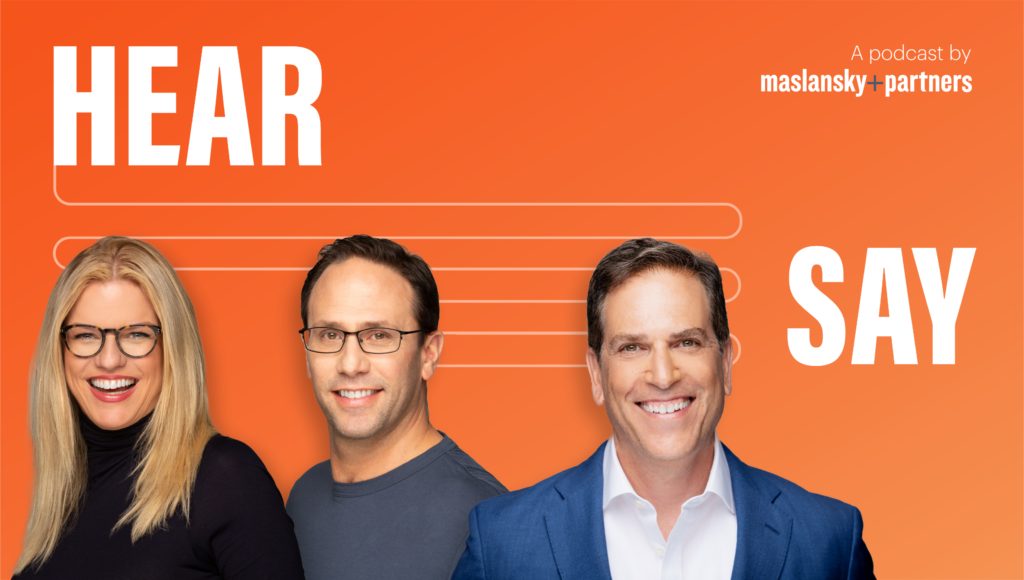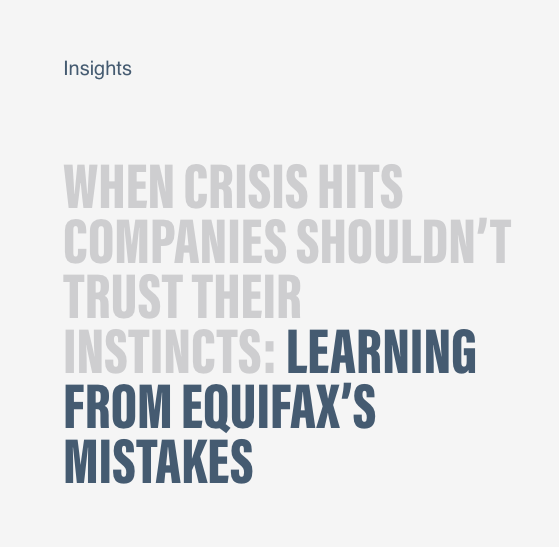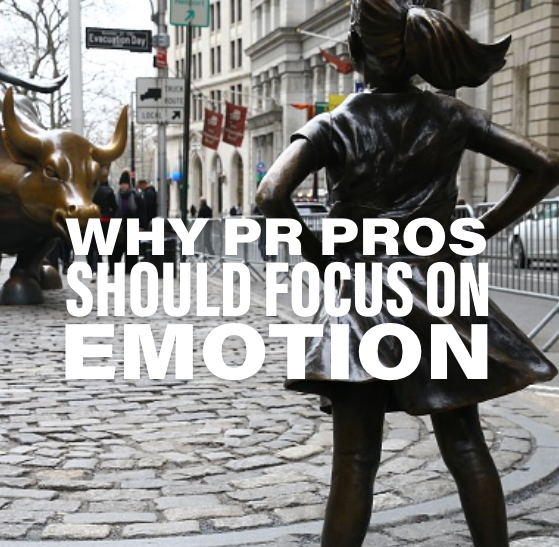You Win the Debate by Framing the Debate

The language experts from maslansky + partners take on the smartest, savviest, and sometimes stupidest messages in the market today. CEO Michael Maslansky and President Lee Carter bring their experience with words, communication, and behavioral science to the table — along with a colleague or client — and offer up a “lay of the language.” Their insight helps make sense of business, life, and culture, and proves over and over again that It’s Not What You Say, It’s What They Hear™.
Language shapes how we view the world around us. The news is no exception. A border crisis. An immigration crisis. A humanitarian crisis. All language used to describe the same story but changes how we view it. Michael and Lee are joined by Partner Ben Feller to talk about the value of personalization, why keeping it simple in your messaging gets you further, and what the idea of credibility and plausibility mean in a post-truth era.
Listen below or on your preferred streaming platform:
LINKS MENTIONED IN THE SHOW
Lee Carter’s book, Persuasion
Michael Maslansky’s book, The Language of Trust
maslansky + partners newsletter
EPISODE 4 TRANSCRIPT:
Michael Maslansky:
The day after the invasion of Ukraine, I intentionally looked at the home pages of the Journal, of the Times, the Washington Post, and the New York Post, and every one of them described what had happened using a different term. It was a special military operation according to the Wall Street Journal, it was a war according to the New York Post, it was only an action according to the Washington Post, and the New York Times called it an attack. I don’t even know that I could map a strategy for each of these media outlets based on their politics to the language that they used, but it certainly has a huge impact on how that as perceived off the bat.
Lee Carter:
They said what?
Welcome to HearSay, a podcast from language strategists at Maslansky + Partners, where we give our take on the strategy behind the smartest, savviest, and stupidest messages in the market today, and what you can learn from them.
Our philosophy is it’s not what you say, it’s what they hear. And that’s why we call this HearSay.
Michael Maslansky:
I’m Michael Maslansky, CEO of the firm that invented language strategy, Maslansky + Partners. And I am also the author of The Language of Trust.
Lee Carter:
And I’m Lee Carter, President of Maslansky + Partners, and author of a book called Persuasion.
Welcome back to another episode of HearSay. As experts in language strategy, we spend a lot of time talking about all different issues related to language, but I’m especially excited about today’s episode where we’re gonna talk about the language strategy that we see all around us. And it really does shape how we look at the world, and the news is no exception. A border crisis, an immigration crisis, a humanitarian crisis. All this means the same thing, but changes how we view it.
Today we’re joined by our newest partner, Ben Feller. Is a former journalist and he is very well suited to help us take a look at how language strategy really helps us see the world differently. Thanks so much for joining us, Ben.
Ben Feller:
Thank you for having me on HearSay and thank you for having at Maslansky + Partners. Great to be here.
Michael Maslansky:
All right Ben, so today we’re gonna tackle some topics that are near and dear to your heart. You spent a fair amount of time at the White House, sitting in the front row, throwing questions at commanders in chief about the issues of the day. And every one of those issues, by the time it made it to the briefing room, had been shaped in the minds of the public. By the time we see politicians answering questions, what’s going on? What the things that you see as being most important when it comes to how we view the world?
Ben Feller:
Yeah. By the time it gets to the briefing room, so much of the shaping has happened and the reporters in that room are facing a White House that’s in active spin mode. What stands out to me right now is that the biggest story coming out of Washington that is affecting the state of play in the country, but also the election going forward, is how the January 6th Committee hearings are playing out. And this whole idea that then-President Trump d- didn’t just fail to act, but he chose not to act. What it suggests and what Democrats are trying to make clear to voters is this guy is going to run again in a few years, and if nothing else we want you to see that he was not an observer of this attack on America, but the one who drove it.
And even though opinions aren’t changing so much by party lines as we’re watching these hearings unfold, I think we’re gonna see that thesis play out whether or not there’s action coming out of the hearings, there’s gonna be a message that we’ve proven that he willingly chose not to act. This was the insurrection that he wanted, and that framing has been really interesting to see what kind of traction it gets.
Michael Maslansky:
Yeah. And we often say, I know you as well, you change the language, you change the debate. And whoever owns the framing often wins the debate. So you’ve got the politicians who have an opportunity to shape the conversation, you’ve got the media and how you cover the conversation who has the opportunity to shape the conversation. Who’s the one doing it?
Ben Feller:
Well, it’s both. The politicians at the best of their game and the people who are employed by them who are really good at this, fashion the language that they think sticks. With some cases they’ll go around the reporters and directly to their audiences, they’re happy to do that. Where it gets tricky is when they clearly don’t have control of the story. There were times when I covered the Obama White House, and there was a series of personnel changes, which to the person following politics could say, “Hey, these guys are in trouble. They’re stagnant. They gotta get a new Chief of Staff, they need a new Defense Secretary.”
Sometimes when I covered that I would use the word shakeup. A shakeup of White House staffing, and boy did that frustrate the people who I covered at the White House. They said, “Why is every change a shakeup? Why do you have to use that word?” I’m like, I made my argument that if you’re changing a series of people at a time when contextually we know that you’re looking for new mojo, there is a shakeup happening. In that case the journalists are shaping it. It’s just another case where one word can matter.
To the ready, who are they gonna count on more to drive how they hear that message? I’ve seen cases where presidents can do it directly and other cases where journalists are clearly having an imprint on the narrative. And boy, when the White House loses that room, they put tremendous emphasis on that. When President, uh, Obama decided to show his long-form birth certificate, that was a story for several days. I asked what ultimately propelled you to do that?
He had already been elected, sworn in, overseeing the deploying of soldiers to war. He’s clearly the president. Why do you have to come out and show the long-form birth certificate now? And they said, “Because the story had reached the briefing room. And that to us was the decider. That once you guys were talking about it, now we have to talk about it.” Which I thought was really interesting.
Michael Maslansky:
Hm. Yeah. So Lee, it seems like it is a endless battle to see who can win the framing debate. I mean, you’re on TV a lot where these discussions are happening. I mean, from that vantage point, what is it that you’re seeing in terms of a push and pull to define how to talk about something?
Lee Carter:
Depending on which network you’re watching, your whole view of the world is being framed differently. If you watch a conservative network, they’re focused right now on the economy, on approval ratings. If you’re watching other networks right now, you’re talking about January 6th, about the threats to democracy. This view shapes how you view the world, the lens that you’re looking at things.
Even beyond that, the way that people talk about specific issues on the news can change the way you view it. I can’t tell you how many stories I’ve been on where we’re talking about human trafficking and drug trafficking, it’s a terrible thing. It’s upsetting. But it … Human trafficking to me almost depersonalizes what it is. Ted Cruz released a video, and he said instead of, uh, human trafficking, talking about it as a slave trade.
And somehow that framing changed and deeply personalized what was going on, so that it created an alarm. Now, whether you like Ted Cruz or not or whether you agree with it, it’s an interesting change in language that does have an impact. Sometimes when you’re thinking about how you frame up an issue, as communicators, we often are speaking to ourselves so that framing will end up being like r- inside baseball and for people to agree with us, and we’re not necessarily gonna change minds.
But every one and a while, it’s important to take a step out and be like, “How do I reach somebody who might have become tone-deaf to this or stopped listening?”
Michael Maslansky:
The human trafficking versus slave trade framing is really interesting. Arguable those who started using the term human trafficking were trying to equate the trafficking in people with the trafficking of drugs, as a way of elevating the importance of it, but in some ways may have dehumanized it, made it feel like it’s something else that is being moved around illegally that we should stop, and the slave trade really makes it much more human. Mu- much more focused on things that we all abhor. So there’s something really interesting there.
We see it all the time. An example that struck me the most earlier this year is the day after the invasion of Ukraine, where I intentionally looked at the home pages of the Journal, of the Times, the Washington Post, and the New York Post, and every one of them described what had happened using a different term. It was a special military operation according to the Wall Street Journal, it was a war according to the New York Post, it was only an action according to the Washington Post, and the New York Times called it an attack. I don’t even know that I could map a strategy for each of these media outlets based on their politics to the language that they used, but it certainly has a huge impact on how that as perceived off the bat.
There’s another thing that I wanted to get your take on, which has evolved, uh, over the last decade or so. When I think back to when we started doing this work and there was a battle to frame issues, it was how do we set our side up to tell their story most effectively in a forum where the other side’s gonna be listening? It was a debate. There were two sides to it, and now more and more it’s arming different groups of people with the language that they’re gonna use often just to talk to those people. What’s the impact of that in terms of what the framing is and how it gets used?
Ben Feller:
It certainly underlines the point Lee was making about people choosing their news and their conversations within their own groups. I’ve seen, uh, a couple cases fr- at the presidential level that were able to supersede that, because the megaphone was so big and the stakes were so high, the candidates were able to reach outside their audiences. One example that really stands out to me was in 2012, the race between Obama and Romney was quite close in that election cycle. And right before Romney had his big moment at the Republican Convention, I had an interview with President Obama where the point he wanted to make to a lot of people through my coverage was that he thought Romney was an extremist, which was not a point he had really made before.
And he kept coming back to that word, to the degree that people who knew Romney outside of Washington, they knew him as a reasonable guy, a maybe stilted moderate of a, the Republican Party, former governor, that typical mold. What Obama was trying to do was shatter that. This guy is not a moderate. If he’s perceived as the moderate alternative to me in a weak economy, he might win. So I have to paint him as an extremist on tax cuts. So you had the extremist framing from the democrats and for Romney, his framing was that Obama is a elitist. You had the extremist versus elitist. Romney had what I thought was a great a line when he gave his acceptance speech, he said that, “President Obama promised to slow the rise of oceans and heal our planet. My promise is to help you and your family.”
The problem was that he gave that speech on the same night that Clint Eastwood spoke to an empty chair, which was a, a moment of bizarre exasperation (laughs). And so it got overshadowed. When you play it all the way out, Obama won, the polling showed that people thought that the country was worse off than it was four years ago, which is usually bellwether for a reelection. The unemployment rate was as, as high as it’s been during the Great Depression, and still the President won. People thought that Obama was the voice of the poor and the middle class, and that Romney tilted towards the rich. In essence, that extremist point of view landed with enough people that they thought it’s better to stay the course than change the course.
Lee Carter:
It’s interesting, ’cause those are still the frames that people are fighting against on both sides today.
Ben Feller:
Mm-hmm.
Michael Maslansky:
Yeah. 20 years ago, not everybody knew that this was something that politicians focused on. It was important, but today it seems like on every debate, everybody is battling to frame the conversation. Some work, some don’t.
Lee Carter:
(laughs).
Michael Maslansky:
Lee, what makes it work? Why do some take hold, and others not?
Lee Carter:
Well, one thing that is really important when you try to figure out what takes hold, is that it’s gotta be something that’s really simple, memorable, and true to your audience. You look back at recent elections, and you will almost certainly be able to tell who won, if you look at what their campaign slogan was. Through the lends of language, uh, we went through a hundred years of campaign slogans, and you can almost always tell, even if you know nothing else about it.
So if you think back to 2016, Donald Trump had a slogan that we all remember. It was, “Make America great again.” And he repeated it over, and over, and over again. To his audience, it meant something very, very important. It meant I haven’t forgotten you. Your jobs aren’t gone forever. It meant there was hope again, to his target audience. It was simple, it was memorable, and it resonated with them because it’s what they wanted.
On the other hand you had Hillary Clinton, whose campaign slogan actually changed like three or four times through her candidacy. Most people would say it’s, “I’m with her.” If you looked at her website, it was Hillary for America. But it ended up being that when you talked about why you were voting for her, you didn’t necessarily have the same story. But if you talked to a Trump voter, “Why are you voting for him?” “He’s gonna make America great again. He’s gonna do these few things.” It was simple, it was repeatable, it was ownable.
Likewise, Barack Obama, very, very similar, hope and change. You still remember it today because it captivated us. It was what we were looking for in that moment. We often try to make things overly complex, but to have a simple cadence that becomes memorable, that becomes symbolic, that becomes your master narrative that you can always come back to, it helps in so many different ways. It helps break through, it helps us transcend, and it defines your space.
Michael Maslansky:
Absolutely. And, and Ben I know you look at the MAGA phrase versus, “I’m with her,” through a different lens, is that in many ways Trump tapped into something about the audience and Hillary did not.
Ben Feller:
Yeah. From a couple directions. One is authenticity. The phrase and the motto has to capture something that people believe to be authentic about the person running, but also it feels right to them. That’s what make America great again did for so many voters. It was they thought that’s Trump in four words. To Lee’s point, it’s authentic to who we are Trump voters that there’s an disenfranchisement here that somebody out there gets us.
The fact that Hillary’s s- slogan at one point was, “I’m with her,” symbolically suggested that it was the voter’s responsibility and decision to go with the candidate, not the other way around. It was a disconnect there. Who stands with the candidate? The other guy was saying, “No, no, no. I stand with you.” These slogans go to not just authenticity, but its cousin, which is credibility. Can we actually believe the candidate s- President Bush succeeded in that when he was running against Kerry? That race could’ve easily gone the other way.
When Kerry said, “I was for before I was against it,” that played into this notion that he is not a credible, consistent guy. As much as he tried to counter, uh, Bush on issues of national security, and his actual service in the military, what people remember from that is sort of the wind surfer, you know, flipping back and forth. And it took hold, because it captured at a lot of voters who might have gone for Kerry otherwise thought that’s authentic. The issue with Trump is that the credibility of make America great again started slipping the moment he was in office, regardless of wh- how you saw him politically.
What is he actually doing? Is he keeping his word? When COVID hit, unprecedented, you know, uh, health crisis, he said in the first few months, “This’ll be over. This’ll be over by the end of the month.” He said it repeatedly, that phrase, “This will be over. This will be over.” And we’ve seen now over a million Americans die, and when you get to a reelection, it’s different. It’s not just the capturing of an idea and how well do you do it versus the, the competition. It’s the capturing of an idea and what have you done? Even in today’s way of judging who’s doing well, at some level you have to govern. And that was just too much to bear.
Lee Carter:
When Donald Trump ran the first time, he ran on make America great again. When he ran the second time, he ran against the radical left. He ran against this hostile takeover. People don’t rally around against messages in the same way that they rally around for messages. Now, when you’re looking at the political landscape going into a midterm year, the polling on Biden is abysmal. He’s got the worst approval rating since, since Truman. And yet, if you look at the generic ballot, republicans are only leading by one point.
Why is that? I think it’s because they haven’t made their case. They’re just framing against Biden, where everybody knows there’s a problem. 90% of Americans are saying there’s a problem with economy. Only 10% say we’re headed in the right direction. But republicans are only winning by one point. That in large part is because they haven’t framed themselves for anything, and it’s a lesson I think that’s really important that is learned across the board.
Michael Maslansky:
That would be another thing to add to our list of things that help you effectively frame how we view the world. Ultimately when you get to the ballot box, if you need people to come out and vote, then you’re gonna need a positive framing to get them there, and that may be where the republicans are lacking and arguable the democrats have failed to coalesce around a positive vision as well. They’ve got individual positive visions for individual sub groups within the democratic party, but no coherent overall vision for how to turn the country around or set it on a positive course.
As we think about how language really shapes how we view the world, it’s really interesting to see how the arguments that politicians use today has evolved. We’ve gone from a world where in the past, if as president, you communicated a position that was supported by data that was relatively true, then you would be successful. And so like the approach of using data is no longer as evident. And in its place seems to be other tools, one of which is this idea of personification, of how do you establish credibility around an idea based on personifying that idea?
Ben Feller:
Every time there’s a mass shooting, there’s a rush for about two weeks for Congress to do something. They always circle around one tactic, which is background checks. And the powers-that-be say 90% of Americans support it. They’ve said that so often, that’s almost a counter argument for saying it at this point (laughs). You know, it just doesn’t matter that most people support it. It’s the specific senators in their states and what do their people think. Would the background checks actually fix that shooting? Perhaps yes, but their reliance on that talking point right away always strikes me as tone-deaf, because that’s not a winning argument.
Michael Maslansky:
What you’ve posed there is that you’ve got an issue where 90+% of the population agrees on an issue, and that data is ineffective at moving the needle. And it’s really because, as you said, it’s tone deaf. If it’s not the right 94% who are influencing the representatives who ultimately have the votes, then it doesn’t matter that it’s 90%.
Ben Feller:
The reliance in going back to an argument that doesn’t work, even if that argument should work, is part of my point. It, it’s not effective and it doesn’t have power to it. And so, yes, it matters who the voters are and how they think, among the politicians who will decide that vote, but more importantly it has to be more personal. That’s what there’s such outrage about in the country, is that when these shootings happen, they are intensely personal.
And that’s how people react. They want to run home and grab their kids, even if they live 3,000 miles away. And yet, the reaction from a c- who, who gets to do something about it perspective is thoughts and prayers and let’s go after background checks. It doesn’t have the powerful personification. And that partly comes to choosing the right message, but also having the right messengers. Who can have that one moment where it says, “Finally is enough.”
When those moments happen, it won’t be because people finally believe the data. It’s because there was a capturing of an emotion of change, matched with policy. That goes to what Obama did in 2008, and to some degree what Trump did in 2016. It’s the person and it’s the personification of that message in a way that people just feel differently. There’s a simplicity to it and a credibility to it.
In the time that I covered Washington, the US Congress saw one of its own members almost killed in an attack. There have been so many things that had made it intensely personal, and yet the country can’t get behind a solution on that one.
Michael Maslansky:
Today, it has evolved into a dual-test of you may have to have the right information, but you have to be the right person to convey it. And in many ways, if you’re the right person it doesn’t matter whether you have the right data, and if you’re the wrong person having the right data doesn’t make a difference. You can be disqualified if you’re not the right messenger. In some ways, it’s very disconcerting that now it’s more identity based than it ever has been before, in terms of shaping the news, shaping opinions.
Ben Feller:
To that point, president Obama in his first term notably pivoted away from the issue of race when asked. Early in his term when he was asked a really thoughtful question by a journalist deep into the, uh, Great Recession, what are your plans to help specifically black people who are suffering, and when can we expect results? And Obama’s answer was essentially, “I don’t have those plans, I’m trying to help everybody.” A rising tide lifts all boats and, and that includes black people who were disproportionately effected.
And he also stumbled over the issue of race not long after when he said that the Cambridge Police acted stupidly in arresting Henry Gates, the professor, on his own, uh, porch, which opened up two weeks of debate about race and that threw Obama off track and ended up in this very stilted Beet Summit in the Rose Garden. So when you contrast that to his second term, he doesn’t have to run for anything again, Obama watches the acquittal of George Zimmerman in the shooting death of Trayvon Martin, the 17-year-old Florida teenager.
Obama comes out and says, “First time I heard about that Trayvon Martin was shot, I thought that could’ve been my son. Could have happened 35 years ago, it could’ve been me and Michelle and I spend a lot of time thinking about what do we do specifically to help young black people.” Obama from a how do I identify my story, my narrative, specifically did not want to be seen as the black president. He wanted to be seen as the American president who was black, and he honored that, but I think he felt a lot more freedom to get personal in his message in the second term.
And the reason he did that was he thought that there had to be a lifting on that issue, and he used those comments to talk about the fear that black men and women have walking down the street, going into an elevator, locking their doors at night. And it was really interesting to me how the personalization of his politics evolved during this time in office.
Michael Maslansky:
There’s something really interesting in there about the nature of using identity and where it might be most effective. Arguably some of the greatest heroes in the presidency over time have been those who have used their identity to play against type. Johnson on Civil Rights, not the guy that you necessarily expected to be a hero of the Civil Rights Movement, Nixon going to China, even your example of Obama saying the best way that I can help black people is to help all people.
Often when we play against type or tell our base that they should do something that they didn’t expect to be asked to do, we get these huge successes. On the other hand, when we’re talking about Obama using race in his second term, he used it seemingly to raise a sense of empathy and awareness, as opposed to as a hammer to kind of nail a policy point of view. But a lot of people use their identity as a way of fighting against the other side.
Lee Carter:
Like Trump, instead of being an outsider he was a business guy who was gonna make deals. He was gonna come in as an outsider.
Michael Maslansky:
Mm-hmm.
Lee Carter:
Like he used that typing to say, “This is gonna hammer home my policy.”
Michael Maslansky:
Yeah.
Lee Carter:
I hate to use that against such a sensitive topic, but it’s making a similar point in that it was used to his advantage to make all kinds of points and hammer them home.
Ben Feller:
Yeah. And by the time President Obama made those comments, that also was against type because he had not spoken in those personal terms about race. When he said, “This could’ve been my son,” it had an outsized response because people were not used to hearing the president speak that way. And part of a winning message too is not just going against type, but saying it in a way that really captures attention, and that did.
Because when you heard him talk about his kids, it was in a very limited context. It was either as a source of privacy, or it was a source of levity, like the dad joke. But when he made it personal that this slain teenager could’ve been my son, it instantly brought attention and elevated it. I think you’re right, it was a matter of empathy and elevation, but it was also surprising.
Michael Maslansky:
As much as we love talking politics, and you used to live in that world, now the companies that we work with tend to be in the commercial space. There’s issues that they work on, but they’re not in the pure world of politics. It seems like there are a lot of lessons here, a lot of applications that we’ve talked about that really apply the idea of keeping it simple, of trying to frame the conversation on our terms, of not relying too heavily on data, of trying to personify or humanize the message and to understand who it is that we’re addressing.
As true as they are in politics, they’re equally true in the business world. It’s always great to see the crossover from one to the other, and how in many ways these are universal lessons that if you can understand them and apply them, they’re gonna help you wherever you are communicating.
Ben Feller:
Yeah. When the conversation happens about politics, there’s a separate breed of American life from a storytelling perspective, understanding your audience and what they need to hear, and how to reach that audience with distillation and clarity and credibility and urgency, and do it better than the competition. It’s exactly the same principle as politics, exactly the same.
Michael Maslansky:
Ben, this is something we ask of every guest, and even though you’re a partner you don’t get away without answering it. What would you say is the most interesting framing shift that you have seen this year?
Ben Feller:
To me, the one that is getting less attention is the framing of the next election happening right now. And I think that not just as a fan of and observer of politics, but ’cause it goes straight to the heart of everybody’s gonna be effected by this debate, of what is the next election going to be decided on? As much as it’s gonna be a referendum on Biden, and we’ll see if he actually runs again, it’s going to be a referendum on Trump still. This ongoing investigation of the attack on the Capitol, to me, this is a prime time show. That’s what they made it.
And we are intending to show that, that the guy who held the office last time didn’t inspire it, he caused it. That’s the debate, that framing has been really interesting and i- it’s not done yet. But if that takes hold, it’s gonna drive the election and if it doesn’t, and the Trump supporters are even more emboldened, we could be seeing a, you know, a repeat in a couple years. And everybody has a stake in that, so it’s been, been interesting to watch.
Lee Carter:
Thanks some much Ben, for joining us today. We love hearing your insights from your past life and your current life, and we are so thankful that you’re here. And thanks Michael, for a great conversation.
For more language insights and to be in the loop on all the other fun stuff we’re doing, follow us on LinkedIn at Maslansky-Partners and join our mailing list at maslanksy.com/connect. That’s all for now, join us next time on HearSay. ‘Cause when it comes to truly effective communications, it’s not what you say, it’s what they hear.









